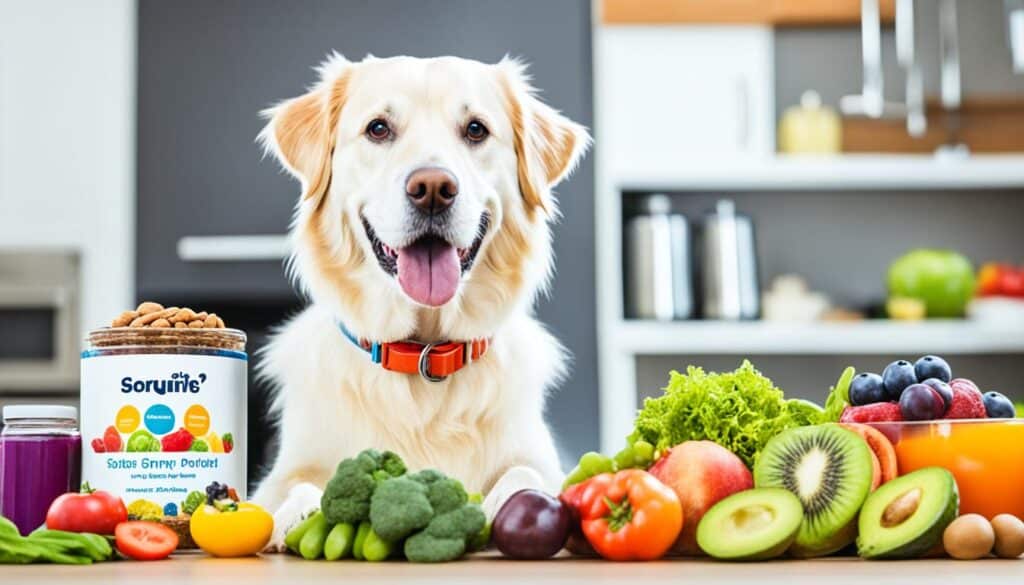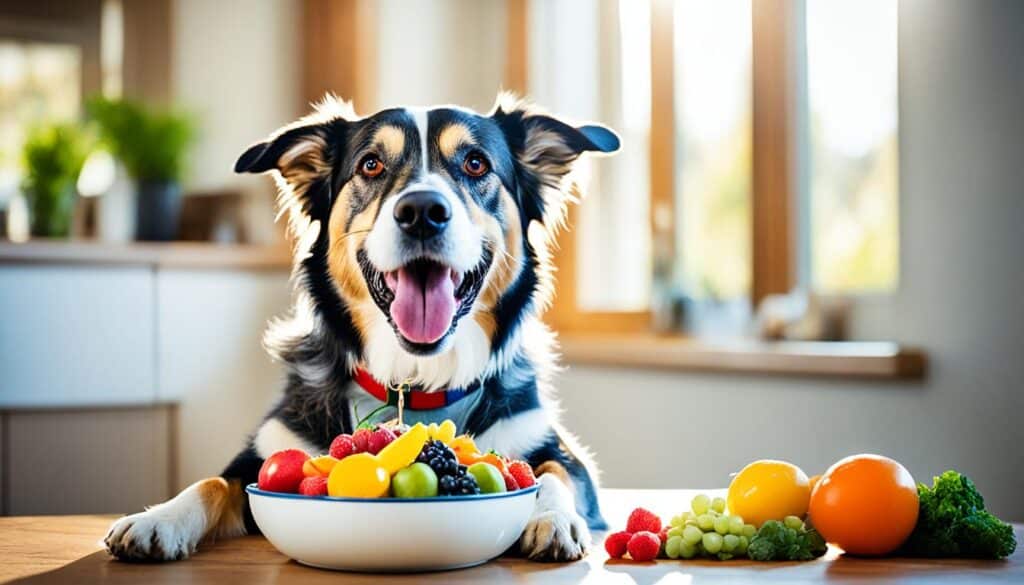Did you know that eating 20% to 25% fewer calories can slow age-related changes and add years to a dog’s life1? The number of senior dogs is increasing, thanks to better nutrition and health care. It’s now more important than ever to meet their dietary needs. Older dogs can face health issues like cancer, kidney, and heart diseases. But, the right diet can lower these risks.
For small breeds, being a senior starts at 10-11 years old. Yet, for large and giant breeds, it happens at 5 to 8 years1. Designing a diet for senior dogs is crucial, based on their size and age. Regular visits to the vet, which includes nutritional checks, are key. This can help keep their calorie intake and diet on the right path.
Since there are no set rules for feeding senior dogs, talking to a vet is very important. They will guide you in making the best food choices. Keeping an eye on your dog’s body weight, muscle, and how much water they drink, is also essential. A balanced diet is vital, combining the right levels of protein, fat, phosphorus, and sodium. This ensures your senior dog stays healthy and happy.
Key Takeaways
- Small breed dogs become senior at 10-11 years old, while large breeds reach this status between 5 and 8 years1.
- Eating 20% to 25% fewer calories can slow aging and potentially increase lifespan1.
- Regular veterinary check-ups are essential for dietary adjustments and managing calorie intake effectively.
- Monitoring body condition, muscle mass, and hydration levels is crucial for a senior dog’s overall health.
- Consult a veterinarian for tailored dietary choices as industry standards for senior dog nutrition are not universally established.
Understanding Senior Dog Nutrition
As dogs get older, they need different foods to stay healthy. Senior dogs see changes in their bodies that demand special care through food. This part will cover what it means for a dog to be senior, the right nutrients, and health problems they may face.
When is a Dog Considered Senior?
When a dog becomes senior varies by its size. Big dogs are seen as elderly between 5 and 8 years old1. Smaller dogs get to this stage around 10–11 years1. Knowing the dietary needs of aging dogs is crucial as they get older.
The Importance of Nutrient Profiles
Older dogs require a diet carefully designed for their changing bodies. This diet should have the right amount of proteins, carbs, fats, and nutrients. For example, senior dogs need less food but more protein to keep their muscles strong as they make less protein themselves2.
Adding omega-3 from fish oils in their diet can help with moving around better. But, this might add to the fat they eat2.
Common Health Issues in Senior Dogs
Senior dogs often face problems like being overweight, kidney issues, and joint pains. Being too heavy can cause more issues than just a few extra pounds3. It’s key to watch what they eat and adjust their meals to prevent obesity.
Adding supplements like glucosamine can help their joints. Making changes to their diet with advice from a vet can make a big difference in how they feel2.
When we think about older dogs, it’s important to remember their special dietary needs. They need the right food at the right time to be as healthy as possible.
Best Diets for Senior Dogs: What You Need to Know
As dogs age, they need different food to stay healthy and active. Knowing the best diets for them means understanding the types of food available, how to change their diet, and managing their calories.
Types of Senior Dog Food
There are many kinds of senior dog food, from dry to wet food and special diets for health problems. These foods might come with extras like glucosamine for joints or omega-3s for the brain and bones. The amount of food needed varies, and you should talk to your vet to get the right advice.
Sodium levels in food can also differ, which is important for dogs with heart problems. Your vet can help you pick the best food for your dog’s health needs4.

Switching to a Senior Dog Diet
Moving to a senior diet should happen slowly to avoid tummy troubles. A lower calorie diet can slow aging in dogs and help them live longer. Keep an eye out for any bad reactions when you change the food, so you can make the right adjustments1.
Controlling Calorie Intake
It’s important to watch how many calories your older dog eats to keep them in good health. An older dog might need fewer calories as they get older. This helps prevent them from getting too heavy and other health issues1.
You should adjust the amount of food to meet your dog’s weight and health goals. Foods for senior dogs can have between 246 to 408 calories in each cup. Choosing the right amount is critical. They also need protein and fiber for muscle and digestion. Regular check-ups with the vet will make sure your dog is eating right as they get older.
How to Address Special Dietary Needs
Senior dogs’ dietary needs must be carefully handled, taking their individual health and conditions into account. They are in the last 25% of their lives, which varies by breed size1. Bigger dogs are seniors between 5-8 years, but smaller ones become seniors at 10-11 years1. Knowing these age phases is key to setting the right diet.
Dogs suffering from heart issues should eat a diet that’s low in calories and sodium5. Diabetic dogs need less fat and more fiber in their food5. It’s important to reduce their daily calories by 10-13% as they grow older1. Giving them quality protein helps maintain their muscles and health5. Plus, avoid too much salt to protect their kidneys and heart1.
Using supplements like glucosamine can improve the joints, beneficial for arthritic dogs4. Always make sure they drink enough water to help prevent dehydration1. Wet food is great for dogs with teeth problems or those who struggle to drink4. Keep an eye on their weight and the amount you feed them to keep their diet on track1. With these steps, you can make sure your older dog gets the nutrition they need, making their life better and longer.
When picking the best food for senior dogs, get advice from a vet. Switching their diet to a senior formula should be slow, to avoid tummy upsets or allergies4. Low-calorie treats can be good to prevent them from getting too heavy1. Special diets for older dogs cover everything from body condition to health issues. By making smart food choices, your senior dog can stay healthy and happy in their later years.
FAQ
When is a dog considered senior?
Why is the nutrient profile important for senior dogs?
What are common health issues in senior dogs?
What types of senior dog food are available?
How do I switch my dog to a senior diet?
How can I control my senior dog’s calorie intake?
Are there special dietary strategies for senior dogs with health conditions?
How can I make food more appealing to a senior dog with a reduced appetite?
What ingredients are beneficial for senior dogs?
How important is hydration for senior dogs?
Source Links
- https://vcahospitals.com/know-your-pet/feeding-mature-and-senior-dogs
- https://www.vet.cornell.edu/departments-centers-and-institutes/riney-canine-health-center/canine-health-information/choosing-food-your-senior-dog
- https://www.orvis.com/diet-and-nutrition-for-older-dogs.html
- https://www.akc.org/expert-advice/nutrition/nutritional-needs-for-senior-dogs/
- https://www.webmd.com/pets/dogs/features/senior-dog-food
